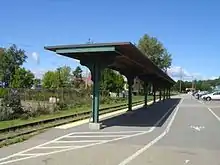Champlain Flyer
The Champlain Flyer was a commuter train that operated in Vermont between Burlington, Shelburne, and Charlotte during 2000–03.
 Champlain Flyer platform at Burlington | |||||||||||||||||||||||||||||||||||||||||||||||||||||||||
| Overview | |||||||||||||||||||||||||||||||||||||||||||||||||||||||||
|---|---|---|---|---|---|---|---|---|---|---|---|---|---|---|---|---|---|---|---|---|---|---|---|---|---|---|---|---|---|---|---|---|---|---|---|---|---|---|---|---|---|---|---|---|---|---|---|---|---|---|---|---|---|---|---|---|---|
| Service type | Commuter rail | ||||||||||||||||||||||||||||||||||||||||||||||||||||||||
| Status | Discontinued | ||||||||||||||||||||||||||||||||||||||||||||||||||||||||
| Locale | Chittenden County, Vermont | ||||||||||||||||||||||||||||||||||||||||||||||||||||||||
| First service | December 4, 2000 | ||||||||||||||||||||||||||||||||||||||||||||||||||||||||
| Last service | February 28, 2003 | ||||||||||||||||||||||||||||||||||||||||||||||||||||||||
| Successor | Champlain Valley Flyer | ||||||||||||||||||||||||||||||||||||||||||||||||||||||||
| Current operator(s) | Vermont Railway | ||||||||||||||||||||||||||||||||||||||||||||||||||||||||
| Route | |||||||||||||||||||||||||||||||||||||||||||||||||||||||||
| Start | Burlington | ||||||||||||||||||||||||||||||||||||||||||||||||||||||||
| Stops | 3 | ||||||||||||||||||||||||||||||||||||||||||||||||||||||||
| End | Charlotte | ||||||||||||||||||||||||||||||||||||||||||||||||||||||||
| Distance travelled | 13 miles (21 km) | ||||||||||||||||||||||||||||||||||||||||||||||||||||||||
| Service frequency | 7.5 round trips per day | ||||||||||||||||||||||||||||||||||||||||||||||||||||||||
| Technical | |||||||||||||||||||||||||||||||||||||||||||||||||||||||||
| Track gauge | 4 ft 8 1⁄2 in (1,435 mm) | ||||||||||||||||||||||||||||||||||||||||||||||||||||||||
| Track owner(s) | Vermont Railway | ||||||||||||||||||||||||||||||||||||||||||||||||||||||||
| |||||||||||||||||||||||||||||||||||||||||||||||||||||||||
The service was started to provide an alternative to US 7 during its reconstruction and to take advantage of public funds earmarked for public transportation. The train began operation on December 4, 2000, with two daily round-trips, with plans to operate as many as ten. Startup costs were $18 million, most of which were provided by Federal government for improving the tracks and grade crossings along the route. At the time of its inception, it was the shortest commuter rail system in the United States.[1][2]
The service's rolling stock consisted of a rebuilt Vermont Railway GP38-2 and ten ex-Virginia Railway Express de-motored RDC cars. Two of these cars were outfitted with cab control.[3] Fares were $1 for a one-way trip, collected on the honor system by being deposited in a box upon entering the train.[4]
Initial ridership figures were lower than expected as the highway reconstruction project was delayed. In 2002, it was threatened to be cut from the state budget.[2] The newly elected Gov. Jim Douglas (who succeeded Gov. Howard Dean of Shelburne) decided that the train was not viable, and the last train ran on February 28, 2003, despite all contracts being pre-paid through the end of the year.[5]
References
- "BIG BUCKS FOR A LITTLE RAILROAD". Cincinnati Post – via HighBeam Research (subscription required) . December 5, 2000. Archived from the original on April 9, 2016. Retrieved December 10, 2012.
- "ISSUE OF REPAYMENT RAISED IN RAIL DEBATE". Boston Globe – via HighBeam Research (subscription required) . March 18, 2002. Archived from the original on March 9, 2016. Retrieved December 10, 2012.
- Wilkins, Van (March 1, 2001). "Commuter Rail update 2001". Mass Transit – via HighBeam Research (subscription required) . Archived from the original on March 29, 2015. Retrieved December 11, 2012.
- Melzer, Matt (July 31, 2001). "Rail Travelogue: Matt Melzer's East Coast Rail Journey". Retrieved February 9, 2015.
- "Vermont Transportation Authority's Champlain Flyer". Railway Age – via HighBeam Research (subscription required) . April 1, 2003. Archived from the original on March 4, 2013. Retrieved December 10, 2012.